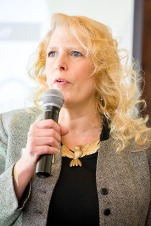Some authors have amassed fortunes. Some travel in private jets. Yet I can’t imagine a single author who would not be interested in having another source of potentially substantial income or would not want to increase their popularity with large numbers of people who might buy their books.
A source of substantial income and a method of increasing the sales of  books is the lucrative and exciting field of public speaking which in my case changed my life, evolving in a wholly unexpected way, with a momentum of its own and with little effort on my part, from writing to speaking to large audiences for large fees.
books is the lucrative and exciting field of public speaking which in my case changed my life, evolving in a wholly unexpected way, with a momentum of its own and with little effort on my part, from writing to speaking to large audiences for large fees.
You may not be an author-public speaker now but may want to become one and may find this post inspiring.
You might also be interested in my other post about public speaking entitled, “How Creatives Should Present Themselves When Speaking to Groups and to the Media.
The Decline of COVID
 Now that COVID is more under control we will be getting back to normal life. Among the changes will be the return of the on-site public speaker who for the past two years has been absent. That will open opportunities for author-speakers. More organizations, associations, and companies will no longer need remote conferences but will again be putting on in-person conferences, seminars, and classes for which they will need quality speakers.
Now that COVID is more under control we will be getting back to normal life. Among the changes will be the return of the on-site public speaker who for the past two years has been absent. That will open opportunities for author-speakers. More organizations, associations, and companies will no longer need remote conferences but will again be putting on in-person conferences, seminars, and classes for which they will need quality speakers.
Everyone is Fascinated by Authors
Because they are considered unique and gifted and somewhat mysterious, authors are admired and envied. Always among the most successful speakers are people who have written a book or books. If you answer, “I am an author” when people ask “What exactly is it you do?” their eyes become as big as a doll’s eyes and they say, “Really?” A survey showed that when choosing a mate women would choose a writer before anyone else.
Books that have something meaningful to say and say it noticeably well can lead to royalties, contracts for additional books, and if you set your mind to it and have self-confidence plus talent, a ticket to enviable speaking engagements. If authors have what it takes by to “come across in a big way” they can make direct contact with many thousands of readers and earn more money than they have earned before.
Some Authors Have a Natural Aptitude for Public Speaking
 Mark Twain, considered by many to be the greatest American writer of all time, is a prime example of a writer who was a gifted speaker. In his day he was known for his public speaking almost as much as for his writing.
Mark Twain, considered by many to be the greatest American writer of all time, is a prime example of a writer who was a gifted speaker. In his day he was known for his public speaking almost as much as for his writing.
I had minimal training as a public speaker. The only public speaking I had done when I started to teach graduate courses at a Chicago university were an introductory public speaking course and a course in dramatic reading in college. Americans fear being attacked by a shark more than they fear anything else; next, they fear having to make a speech. Even the thought of public speaking made me nervous; I was not confident. I defined myself as a writer, not as a speaker. It would have been inconceivable for me then to expect to become the speaker to audiences of thousands, who would be in high demand and make a very good living from public speaking and would come to adore public speaking more than any other professional activity, including writing books, an activity I loved and which my life had been aimed at since childhood.
I was so uncomfortable with public speaking that I thought seriously about not taking that first teaching job, and went over the pros and cons again and again in my mind. But I sensed it was a challenge I should face and a fear I should overcome. My wife was very encouraging and said I should go ahead with it.
I took the job, and within weeks discovered that the teaching experience was fulfilling, as I discovered I had an unexpected gift for communicating information to a group of people sitting in front of me, people who, in turn, would rate the course and me highly. I was encouraged and founded a management consulting company, and provided training courses to clients. I delivered many lectures and grew in public speaking skill and self-confidence.
My books had been published since I was in my mid-twenties. By the time my books Fighting to Win and Waging Business Warfare were  published I was a seasoned public speaker to small groups of no more than about two hundred people. But because of the popularity of both those books–traditional print best sellers–I jumped to speaking engagements involving much larger audiences for high fees in North America and Europe. I was then “in the chips” from royalties and lecture fees.
published I was a seasoned public speaker to small groups of no more than about two hundred people. But because of the popularity of both those books–traditional print best sellers–I jumped to speaking engagements involving much larger audiences for high fees in North America and Europe. I was then “in the chips” from royalties and lecture fees.
A great pleasure for me was meeting and often forming friendships with so many pleasant and interesting people. My life was exciting. It would change as if in a wind, bringing happy surprises every day. Business opportunities popped up.
A big break for me and a turning point as a speaker was giving the keynote address at a National Association of Broadcasters annual conference with three thousand people in attendance, enough of whom as a result a successful speech hired me for their events that my career was then put on fast track. Then there were major engagements as keynoter at many conferences, particularly in exciting industries–radio, television, cable, music, and the American auto industry. They became my specialties.
 Always aim to be the keynoter. Make that a goal you will eventually reach. Be bold and optimistic. A keynoter is paid the most and has a major role. In a movie the star carries the whole production. The keynoter sets the standard for the whole conference.
Always aim to be the keynoter. Make that a goal you will eventually reach. Be bold and optimistic. A keynoter is paid the most and has a major role. In a movie the star carries the whole production. The keynoter sets the standard for the whole conference.
I didn’t need to advertise. I didn’t need an agent. I wrote articles about their medium for their major industry magazines that were interesting for me to do and drew attention. Not being “in” the field, my ideas were fresh and often innovative. For example, working with people who owned numbers of radio stations I developed strategies that would increase any station’s ratings and advertising revenues.
My appeal as a speaker was passed by word of mouth. Each success led to additional opportunities. I was busy, constantly flying somewhere, staying in some hotel or resort, there to speak to audiences of two, five, or six thousand people, in Paris eight thousand.
If you can get in front of a large audience as I did–and impress– very many positive benefits will follow. Quite profitable speaking engagements will appear out of the blue. Sometimes that happens serendipitously: a reader of your book recommends you as a speaker.
Writers Have Advantages as Speakers
An immediate advantage writers have as speakers over speakers from other fields is simply that by definition writers are especially skilled in the  use of language to entertain, educate, and persuade–the goals also of speeches. They are trained and educated to write. If you are to succeed as a public speaker you must first write polished speeches, Good writers are equipped to do that. Writing and public speaking are related talents. The good speaker tells stories as novelists tell stories. Good writers and good speakers are clear. Their choice of words is interesting. They are able to simplify complicated ideas.
use of language to entertain, educate, and persuade–the goals also of speeches. They are trained and educated to write. If you are to succeed as a public speaker you must first write polished speeches, Good writers are equipped to do that. Writing and public speaking are related talents. The good speaker tells stories as novelists tell stories. Good writers and good speakers are clear. Their choice of words is interesting. They are able to simplify complicated ideas.
Artists can be wonderful speakers and writers. I’m constantly impressed with what excellent writers artists sometimes are, at times better writers than writers, as Vincent van Gogh, for example, was a masterful writer. So many of them have excellent verbal abilities and give spell-binding talks as teachers and conference speakers.
Prize the Speech You Write
Speeches that will become the staple of the author-speaker and artist-speaker and delivered often should first be written down and honed through many written drafts as carefully as a painting, poem, short story, play, or novel would be, and then, of course, practiced many, many times until the delivery of the speech is flawless. Be ready to work hard on your speeches or talks. Because there is so much money to be made, public speaking is highly competitive, and the quality of the written speech itself separates one speaker from another. A beautifully written speech is literature. I had an advantage in that I had been employed as a speech writer in the past.
You have two products that the audience will hear and see: the speech you have carefully composed is a product and you are a product too. The author-speaker and artist-speaker thinking the excellence-generating thought “why do something unless I do it extremely well” aims to develop a superb, unforgettable speech and then to deliver it superbly and unforgettably again and again.
There Are Social Benefits for Author and Artist Speakers
A major benefit of being an author or artist-speaker is the pleasure that role makes available to the person who has left a quiet work place  where creative work is done in solitude and gone out into the noisy world and through public speaking come in contact with live human beings that open new vistas. Creatives-speakers then see before their eyes how people respond to their ideas and to them. They now interact with people who have come to listen to them and perhaps to meet them, to ask questions and share opinions, to hear what they have to say, and to applaud them–new and gratifying experiences for many writers and artists who never leave their work room.
where creative work is done in solitude and gone out into the noisy world and through public speaking come in contact with live human beings that open new vistas. Creatives-speakers then see before their eyes how people respond to their ideas and to them. They now interact with people who have come to listen to them and perhaps to meet them, to ask questions and share opinions, to hear what they have to say, and to applaud them–new and gratifying experiences for many writers and artists who never leave their work room.
Talent and Preparation Are the Keys to Successful Public Speaking
Some people are so naturally talented that even in their first major speech they are magnificent, but even they benefit from careful preparation. You must realize that preparation is a key to public speaking success. That extremely thorough preparation is mandatory cannot possibly be overstated.
By that I mean preparation certainly of the words you will speak in your speech, but also preparation of your character. You must always be a  sincere and genuinely decent person, and that will come across to your listeners. You may not be brilliant, a spell-casting word-smith, or physically appealing, all of which help a speaker. But people will forgive you those deficiencies. If you are a sincere, genuinely decent man or woman the effect on the audience can be potent and positive.
sincere and genuinely decent person, and that will come across to your listeners. You may not be brilliant, a spell-casting word-smith, or physically appealing, all of which help a speaker. But people will forgive you those deficiencies. If you are a sincere, genuinely decent man or woman the effect on the audience can be potent and positive.
Unfortunately Many Authors Have Not Developed Their Public Speaking Abilities
I went to my local library, looking forward to hearing a top bestselling author speak, and found her presentation childish and silly. She was there just to be admired by her fans. I’m sure they were disappointed. I went to a conference of poets reading and talking about their poetry, and selling their chapbooks. Some poets were very shy and uncomfortable; some just didn’t know much about projecting a lively, intelligent, and authentic presence. Some were unprepared; and some were disinterested. Some obviously dreaded facing an audience as I once did. Some seemed to be unpleasant people you’d like to have nothing to do with, let alone listen to.
I’ve often wondered when there are books and art works to be promoted and speakers can earn thousands of dollars for forty-five minute speeches, why they don’t take the time to learn what is learnable: how to overcome fears of public speaking and how to speak interestingly, charmingly, intelligently, and persuasively in a down to earth manner.
Authors must concentrate first on their writing because that’s their main pursuit. But they benefit from being more well-rounded and becoming accomplished speakers as well. Possibly Jane Austen never had to speak to a group, but now, two centuries later, producing something creative and speaking publically are similar talents that go hand in hand.
© 2022 David J. Rogers
For my interview from the international teleconference with Ben Dean about Fighting to Win, click the following link:
Order Fighting to Win: Samurai Techniques for Your Work and Life eBook by David J. Rogers
or
Order Waging Business Warfare: Lessons From the Military Masters in Achieving Competitive Superiority
or








